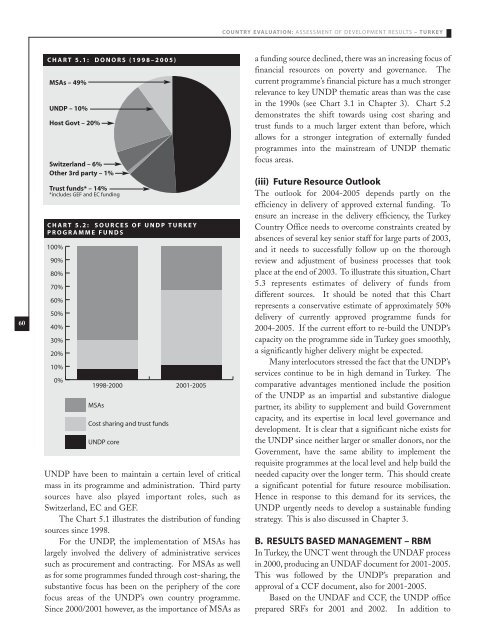Reports - United Nations Development Programme
Reports - United Nations Development Programme
Reports - United Nations Development Programme
Create successful ePaper yourself
Turn your PDF publications into a flip-book with our unique Google optimized e-Paper software.
COUNTRY EVALUATION: ASSESSMENT OF DEVELOPMENT RESULTS – TURKEY<br />
60<br />
CHART 5.1: DONORS (1998–2005)<br />
MSAs – 49%<br />
UNDP – 10%<br />
Host Govt – 20%<br />
Switzerland – 6%<br />
Other 3rd party – 1%<br />
Trust funds* – 14%<br />
*includes GEF and EC funding<br />
CHART 5.2: SOURCES OF UNDP TURKEY<br />
PROGRAMME FUNDS<br />
100%<br />
90%<br />
80%<br />
70%<br />
60%<br />
50%<br />
40%<br />
30%<br />
20%<br />
10%<br />
0%<br />
1998-2000<br />
MSAs<br />
Cost sharing and trust funds<br />
UNDP core<br />
2001-2005<br />
UNDP have been to maintain a certain level of critical<br />
mass in its programme and administration. Third party<br />
sources have also played important roles, such as<br />
Switzerland, EC and GEF.<br />
The Chart 5.1 illustrates the distribution of funding<br />
sources since 1998.<br />
For the UNDP, the implementation of MSAs has<br />
largely involved the delivery of administrative services<br />
such as procurement and contracting. For MSAs as well<br />
as for some programmes funded through cost-sharing, the<br />
substantive focus has been on the periphery of the core<br />
focus areas of the UNDP’s own country programme.<br />
Since 2000/2001 however, as the importance of MSAs as<br />
a funding source declined, there was an increasing focus of<br />
financial resources on poverty and governance. The<br />
current programme’s financial picture has a much stronger<br />
relevance to key UNDP thematic areas than was the case<br />
in the 1990s (see Chart 3.1 in Chapter 3). Chart 5.2<br />
demonstrates the shift towards using cost sharing and<br />
trust funds to a much larger extent than before, which<br />
allows for a stronger integration of externally funded<br />
programmes into the mainstream of UNDP thematic<br />
focus areas.<br />
(iii) Future Resource Outlook<br />
The outlook for 2004-2005 depends partly on the<br />
efficiency in delivery of approved external funding. To<br />
ensure an increase in the delivery efficiency, the Turkey<br />
Country Office needs to overcome constraints created by<br />
absences of several key senior staff for large parts of 2003,<br />
and it needs to successfully follow up on the thorough<br />
review and adjustment of business processes that took<br />
place at the end of 2003. To illustrate this situation, Chart<br />
5.3 represents estimates of delivery of funds from<br />
different sources. It should be noted that this Chart<br />
represents a conservative estimate of approximately 50%<br />
delivery of currently approved programme funds for<br />
2004-2005. If the current effort to re-build the UNDP’s<br />
capacity on the programme side in Turkey goes smoothly,<br />
a significantly higher delivery might be expected.<br />
Many interlocutors stressed the fact that the UNDP’s<br />
services continue to be in high demand in Turkey. The<br />
comparative advantages mentioned include the position<br />
of the UNDP as an impartial and substantive dialogue<br />
partner, its ability to supplement and build Government<br />
capacity, and its expertise in local level governance and<br />
development. It is clear that a significant niche exists for<br />
the UNDP since neither larger or smaller donors, nor the<br />
Government, have the same ability to implement the<br />
requisite programmes at the local level and help build the<br />
needed capacity over the longer term. This should create<br />
a significant potential for future resource mobilisation.<br />
Hence in response to this demand for its services, the<br />
UNDP urgently needs to develop a sustainable funding<br />
strategy. This is also discussed in Chapter 3.<br />
B. RESULTS BASED MANAGEMENT – RBM<br />
In Turkey, the UNCT went through the UNDAF process<br />
in 2000, producing an UNDAF document for 2001-2005.<br />
This was followed by the UNDP’s preparation and<br />
approval of a CCF document, also for 2001-2005.<br />
Based on the UNDAF and CCF, the UNDP office<br />
prepared SRFs for 2001 and 2002. In addition to

















